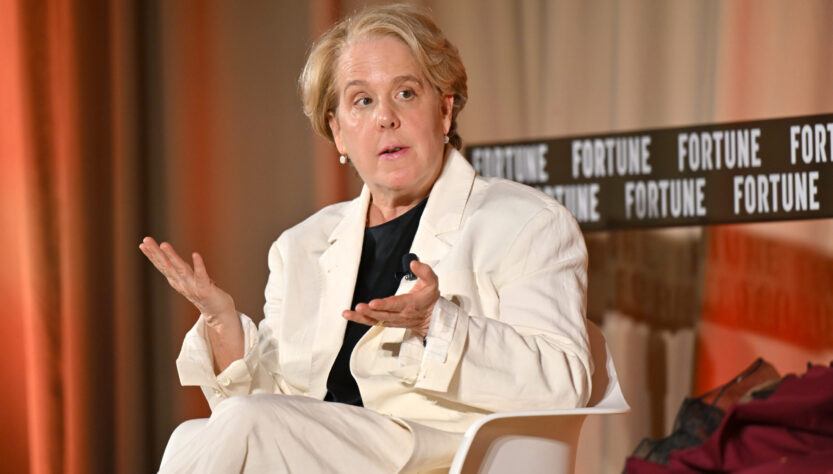
Robbie Kaplan (Photo by Lisa Lake/Getty Images for Fortune Media )
Famed litigator Roberta Kaplan is leaving her eponymous firm (Kaplan Hecker & Fink) to start yet another litigation boutique. Lawyers don’t often leave the firms that they headline, but it’s not entirely unheard of. Elihu Root Jr. left Root Clark to join Cleary Gottlieb. But that was in 1954, so… it’s still fairly uncommon.
In a Bloomberg Law interview, Kaplan cites the boutique’s growth for the departure:
“It’s really that the firm grew rapidly, which is great, but it grew in size and complexity beyond what I had in mind and I wanted to get back to something nimbler,” Kaplan said in an interview.
Having left Paul Weiss, where she’d been for 25 years to build the boutique, it’s understandable if the A+ litigator — known for securing victories in U.S. v. Windsor and the E. Jean Carroll case — might not be enthusiastic about finding herself in another burgeoning bureaucracy.
The firm — soon to be known as Hecker Fink — is also saying all the right things.
“Robbie’s contributions to the firm have been immeasurable,” Kaplan Hecker & Fink said in a statement. “We know Robbie will continue to change the world from her new perch and look forward to continuing to work together.”
That said, the New York Times has a report that “months of internal frustration over Ms. Kaplan’s conduct toward other lawyers” led to Kaplan’s removal “from the firm’s management committee and precipitated her departure.”
The Times notes:
Her departure was announced after The Times informed her personal lawyers that it was preparing to publish an article about Ms. Kaplan that would shine a light on complaints about what some employees said was an unprofessional office culture that she presided over. Her lawyers had no comment on Wednesday night.
The allegations against Kaplan include claims she “insulted employees, inappropriately commented on their looks and threatened to derail people’s careers.” There were also reportedly issues at the firm over some Kaplan clients (ahem, Andrew Cuomo) and the conflict that posed with the values of the #MeToo movement.
The statement from Kaplan’s team refuted those allegations:
Lawyers for Ms. Kaplan denied that she made inappropriate comments to her colleagues and said her firm took allegations of workplace misconduct seriously. They added that “there is nothing more unremarkable than trial lawyers using colorful language, criticizing their peers and representing diverse clients with no expectation of ideological purity.”
For her own part, Kaplan told the Times:
“The work I do is high-stakes and challenging, requiring both toughness and precision,” Ms. Kaplan said in a statement to The Times. Because she has taken on “some of the world’s biggest bullies,” she added, “there are people who don’t like me, which comes with the territory, particularly when you are a woman. I am proud of my record as a lawyer, colleague and mentor.”
High-stakes and controversial cases like Kaplan’s book of business are a challenge to litigate and Biglaw partners rarely enjoy the luxury of keeping everyone around them happy. That doesn’t excuse inappropriate workplace behavior — lawyers (especially from the Biglaw pressure cooker culture) need to be better across the board — but it is part of the context whenever stories like these bubble to the surface. Making a clean break and building a new team from scratch should help everyone involved.
 Kathryn Rubino is a Senior Editor at Above the Law, host of The Jabot podcast, and co-host of Thinking Like A Lawyer. AtL tipsters are the best, so please connect with her. Feel free to email her with any tips, questions, or comments and follow her on Twitter @Kathryn1 or Mastodon @Kathryn1@mastodon.social.
Kathryn Rubino is a Senior Editor at Above the Law, host of The Jabot podcast, and co-host of Thinking Like A Lawyer. AtL tipsters are the best, so please connect with her. Feel free to email her with any tips, questions, or comments and follow her on Twitter @Kathryn1 or Mastodon @Kathryn1@mastodon.social.

